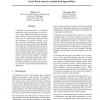Free Online Productivity Tools
i2Speak
i2Symbol
i2OCR
iTex2Img
iWeb2Print
iWeb2Shot
i2Type
iPdf2Split
iPdf2Merge
i2Bopomofo
i2Arabic
i2Style
i2Image
i2PDF
iLatex2Rtf
Sci2ools
CEAS
2005
Springer
2005
Springer
Good Word Attacks on Statistical Spam Filters
Unsolicited commercial email is a significant problem for users and providers of email services. While statistical spam filters have proven useful, senders of spam are learning to bypass these filters by systematically modifying their email messages. In a good word attack, one of the most common techniques, a spammer modifies a spam message by inserting or appending words indicative of legitimate email. In this paper, we describe and evaluate the effectiveness of active and passive good word attacks against two types of statistical spam filters: naive Bayes and maximum entropy filters. We find that in passive attacks without any filter feedback, an attacker can get 50% of currently blocked spam past either filter by adding 150 words or fewer. In active attacks allowing test queries to the target filter, 30 words will get half of blocked spam past either filter.
Related Content
| Added | 26 Jun 2010 |
| Updated | 26 Jun 2010 |
| Type | Conference |
| Year | 2005 |
| Where | CEAS |
| Authors | Daniel Lowd, Christopher Meek |
Comments (0)

